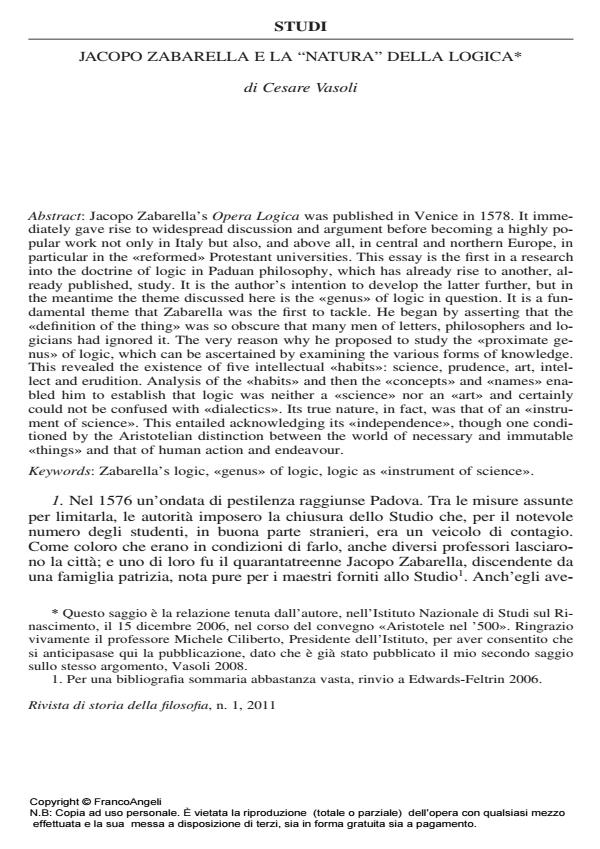Jacopo Zabarella e la "natura" della logica
Journal title RIVISTA DI STORIA DELLA FILOSOFIA
Author/s Cesare Vasoli
Publishing Year 2011 Issue 2011/1
Language Italian Pages 22 P. 1-22 File size 714 KB
DOI 10.3280/SF2011-001001
DOI is like a bar code for intellectual property: to have more infomation
click here

FrancoAngeli is member of Publishers International Linking Association, Inc (PILA), a not-for-profit association which run the CrossRef service enabling links to and from online scholarly content.
Jacopo Zabarella’s Opera Logica was published in Venice in 1578. It immediately gave rise to widespread discussion and argument before becoming a highly popular work not only in Italy but also, and above all, in central and northern Europe, in particular in the «reformed» Protestant universities. This essay is the first in a research into the doctrine of logic in Paduan philosophy, which has already rise to another, already published, study. It is the author’s intention to develop the latter further, but in the meantime the theme discussed here is the «genus» of logic in question. It is a fundamental theme that Zabarella was the first to tackle. He began by asserting that the «definition of the thing» was so obscure that many men of letters, philosophers and logicians had ignored it. The very reason why he proposed to study the «proximate genus » of logic, which can be ascertained by examining the various forms of knowledge. This revealed the existence of five intellectual «habits»: science, prudence, art, intellect and erudition. Analysis of the «habits» and then the «concepts» and «names» enabled him to establish that logic was neither a «science» nor an «art» and certainly could not be confused with «dialectics». Its true nature, in fact, was that of an «instrument of science». This entailed acknowledging its «independence», though one conditioned by the Aristotelian distinction between the world of necessary and immutable «things» and that of human action and endeavour.
Keywords: Zabarella’s logic, «genus» of logic, logic as «instrument of science»
- Giacomo Zabarella: un aristotélico crítico en la era de la revolución científica José Manuel García Valverde, in Anales del Seminario de Historia de la Filosofía /1970 pp.587
DOI: 10.5209/ASHF.56802 - Idee di lavoro e di ozio per la nostra civiltà Amalia Salvestrini, pp.317 (ISBN:979-12-215-0319-7)
- Encyclopedia of Renaissance Philosophy Marco Sgarbi, pp.3563 (ISBN:978-3-319-14168-8)
- Encyclopedia of Renaissance Philosophy Marco Sgarbi, pp.1 (ISBN:978-3-319-02848-4)
Cesare Vasoli, Jacopo Zabarella e la "natura" della logica in "RIVISTA DI STORIA DELLA FILOSOFIA" 1/2011, pp 1-22, DOI: 10.3280/SF2011-001001